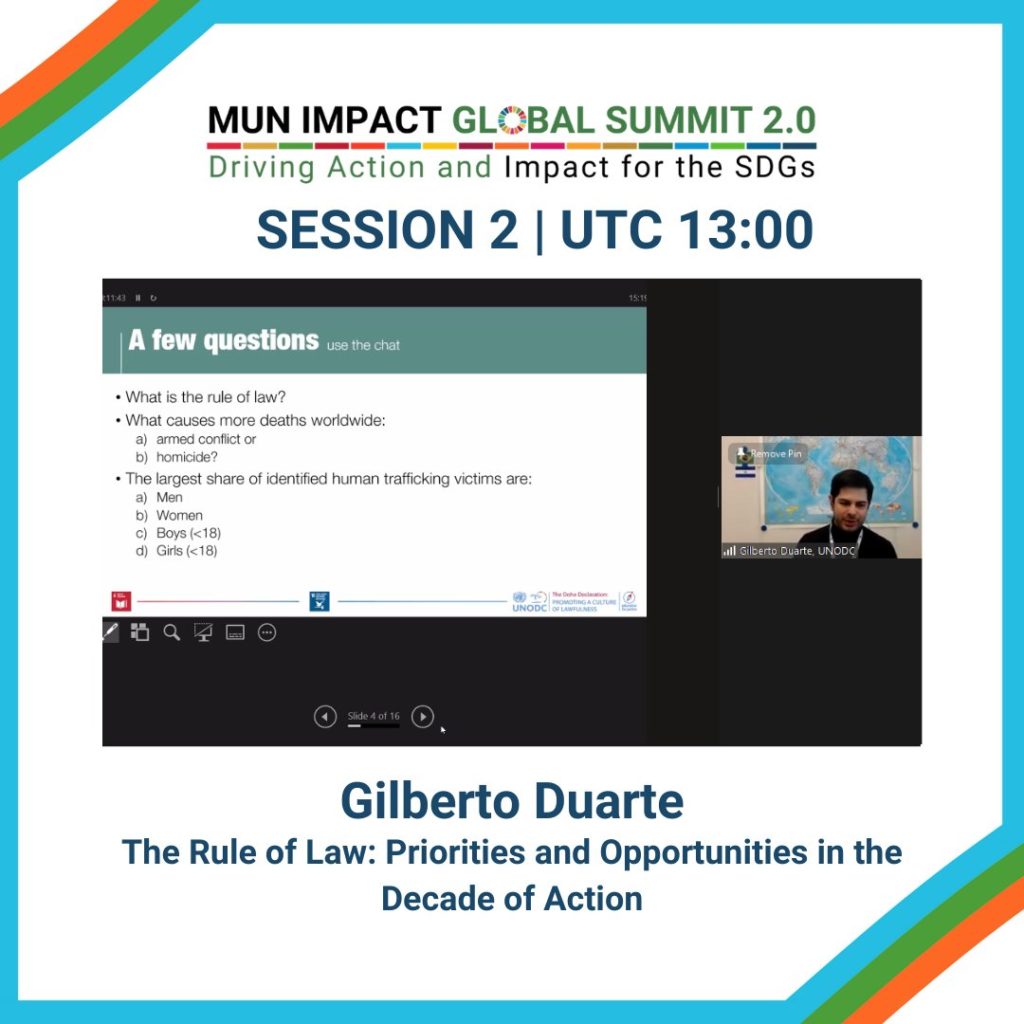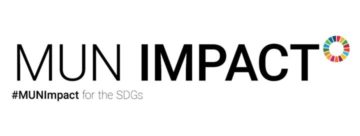
By Meenakshi Mariappan
–
Although it was a “cloudy and miserable” day down in Vienna as attested by our speaker, Mr Gilberto Duarte, the session inarguably enlightened all those present about the rule of law. Joining us from Austria, was Mr Gilberto Duarte who works at the United Nations Office on Drugs and Crime. The session was also attended by a diverse group of participants representing around 15 countries and regions, spanning from South India to Central America and everywhere in between. And as Mr Duarte rightfully noted, this diversity is “what MUN Impact and the Global Summit is all about!”
Getting into the specifics of the session, the first question touched upon was evidently this: “What is the rule of law?” To help participants answer this question, Mr Duarte introduced some more questions as food for thought. “Which of these causes more deaths worldwide? Armed conflict or homicide? Whilst the chat was immediately flooded by responses from participants, Mr Duarte played to our sense of eagerness and curiosity by not immediately disclosing the answers. When participants were then asked what came to their minds when talking about ‘the rule of law,’ few answers which seemed to resonate across the enthusiastic group of attendees were “justice, equality, humanity and that no one is above the law.”
In revealing what the UN actually pronounces as the rule of law, Mr Duarte finally shared with the group the definition as can be found on un.org/ruleoflaw. “For the United Nations (UN) system, the rule of law is a principle of governance in which all persons, institutions and entities, public and private, including the State itself, are accountable to laws that are publicly promulgated, equally enforced and independently adjudicated, and which are consistent with international human rights norms and standards.” At this point, he stopped to provide some alarming statistics; homicide caused the most deaths worldwide at a staggering 400,000 whilst armed conflict caused only 80,000 deaths. In putting forth these questions, Mr Duarte was able to successfully draw connections between these issues and the rule of law. In relation to the UNODC, the speaker went on to say that their work revolves around some “core rule of law issues,” including corruption and integrity, crime prevention and criminal justice, and organised crime.
“But with ten years left for the 2030 agenda, what does this mean for the rule of law and SDG 16 during the decade of action?” Surprisingly, Mr Duarte informs participants that “for the very first time, SDG 16 — Peace, Justice and Strong Institutions — has been identified as part of the 2030 agenda; it means the rule of law is key to achieving the SDGs.” Upon further discussion from both Mr Duarte and the participants’ side, it was also observed that various other SDGs have targets directly linked to the rule of law. These include, but are not limited to, SDGs 4 (quality education), 5 (gender equality), 8 (decent work and economic growth), 10 (reduced inequalities), 11 (sustainable cities and communities), 15 (life on land), and of course, 16. However, it was later said that the Pathfinders, as they call themselves, “created an approach to look at the rule of law and all of the SDGs,” more information on which can be found at www.sdg16.plus. To end the session on a relevant note, there was an unavoidable discussion on the Covid-19 pandemic and how it has affected the rule of law and efforts to achieve SDG 16 in particular.
As all participants were hence able to see, the rule of law is “not a simple thing,” the speaker pointed out, “there are multiple dimensions to it.” In addition to reiterating the significance of the rule of law, there was one takeaway that shone through all aspects of discussion and interaction in the session: “The SDGs are all interconnected. All goals matter.”
The full recorded session of this workshop can be accessed here.
